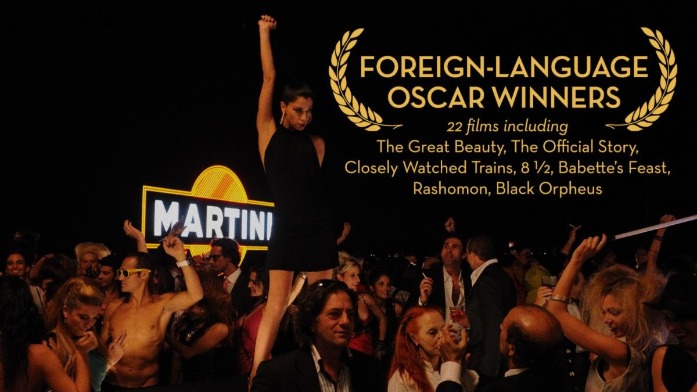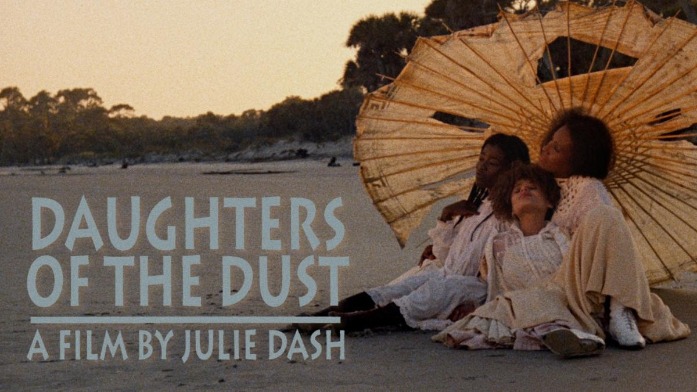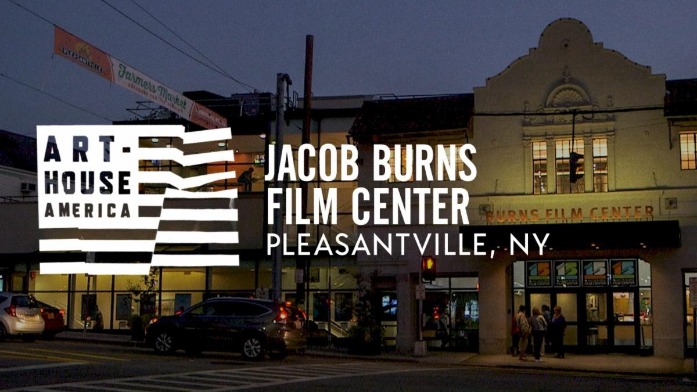The Criterion Channel’s February 2020 Lineup

This February, we’re celebrating Black History Month by paying tribute to the vital contributions of black filmmakers to cinema of the past and present. From a career retrospective of the iconic Sidney Poitier to a treasure trove of long-neglected works from early African American filmmaking pioneers to paradigm-shifting visions from contemporary trailblazers Julie Dash and Mati Diop, we’re shining a necessary light on a past of perseverance and innovation and looking forward to the bright future of black film.
Also playing this month: the exclusive streaming premiere of Bi Gan’s Long Day’s Journey into Night, a selection of our favorite foreign-language Oscar winners, Ronald Bronstein’s unsettling debut, a celebration of the late Anna Karina and her creative partner Jean-Luc Godard, and a new episode of Art-House America!
If you haven’t signed up yet, head to CriterionChannel.com and get a 7-day free trial!
** indicates programming available only in the U.S.
SATURDAY, FEBRUARY 1
Saturday Matinee: LambSUNDAY, FEBRUARY 2

Starring Sidney Poitier
Featuring a new interview with film scholar Mia Mask
Both one of the greatest actors of the twentieth century and a transformative cultural icon, Sidney Poitier forever changed the way African Americans were represented on screen. The first black performer to win the Academy Award for best actor and one of the first black directors to work in the Hollywood studio system, Poitier paved the way for a new generation of African American stars and filmmakers with his unwavering integrity. Defying decades of racist stereotyping within mainstream Hollywood cinema, Poitier brought dignity and humanity to his powerful performances in these zeitgeist-defining classics.
Featuring: Cry, the Beloved Country (Zoltán Korda, 1951), Good-bye, My Lady (William A. Wellman, 1956), Edge of the City (Martin Ritt, 1957)*, The Defiant Ones (Stanley Kramer, 1958), A Raisin in the Sun (Daniel Petrie, 1961), Paris Blues (Martin Ritt, 1961), Pressure Point (Hubert Cornfield, 1962), Lilies of the Field (Ralph Nelson, 1963), The Slender Thread (Sydney Pollack, 1965), A Patch of Blue (Guy Green, 1965)*, Duel at Diablo (Ralph Nelson, 1966), In the Heat of the Night (Norman Jewison, 1967), Guess Who’s Coming to Dinner (Stanley Kramer, 1967), To Sir, with Love (James Clavell, 1967), They Call Me Mister Tibbs! (Gordon Douglas, 1970), Brother John (James Goldstone, 1971), Buck and the Preacher (Sidney Poitier, 1972), A Warm December (Sidney Poitier, 1973), Uptown Saturday Night (Sidney Poitier, 1974)
MONDAY, FEBRUARY 3

Foreign-Language Oscar Winners
As you put the finishing touches on this year’s Oscar-pool ballots, reacquaint yourself with these past winners of the Academy Award for best foreign-language film. A cross section of the last seven decades of international cinema, this lineup includes masterpieces by titans like Akira Kurosawa, Federico Fellini, Ingmar Bergman, and Luis Buñuel, and, of course, a handful of left-field surprises (it is the Academy Awards, after all).
Featuring: Rashomon (Akira Kurosawa, 1950), Gate of Hell (Teinosuke Kinugasa, 1953), La strada (Federico Fellini, 1954), Nights of Cabiria (Federico Fellini, 1957), Mon oncle (Jacques Tati, 1958), Black Orpheus (Marcel Camus, 1959), The Virgin Spring (Ingmar Bergman, 1960), Through a Glass Darkly (Ingmar Bergman, 1961), 8½ (Federico Fellini, 1963), The Shop on Main Street (Ján Kadár and Elmar Klos, 1965), Closely Watched Trains (Jiří Menzel, 1966), War and Peace (Sergei Bondarchuk, 1966–67), Z (Costa-Gavras, 1969), The Discreet Charm of the Bourgeoisie (Luis Buñuel, 1972), Amarcord (Federico Fellini, 1973), Day for Night (François Truffaut, 1973), Dersu Uzala (Akira Kurosawa, 1975), The Tin Drum (Volker Schlöndorff, 1979), Fanny and Alexander (Ingmar Bergman, 1982), The Official Story (Luis Puenzo, 1985), Babette’s Feast (Gabriel Axel, 1987), The Great Beauty (Paolo Sorrentino, 2013)
TUESDAY, FEBRUARY 4
Short + Feature: Tourist Traps
The Beast and The Naked Prey
The tables turn on white tourists in South Africa in these subversive anticolonialist parables that question the meaning of “civilization.”
WEDNESDAY, FEBRUARY 5

Daughters of the Dust
Forging a radical new visual language rooted in black femininity and the rituals of Gullah culture, Julie Dash’s rapturous vision of vanishing ways of life in the turn-of-the-century South was the first film directed by an African American woman to receive a wide release.
THURSDAY, FEBRUARY 6

Long Day’s Journey into Night
Exclusive streaming premiere
China’s biggest art-house hit of all time, Bi Gan’s dazzling sophomore feature is a hallucinatory, noir-tinged stunner about a lost soul on a quest to find a woman from his past, and includes an immersive, gravity-defying sequence that ranks as one of the true marvels of modern cinema.
FRIDAY, FEBRUARY 7
Double Feature: Con Me If You Can
The Grifters and House of Games
Good luck keeping up with who’s scamming who in these fiendishly seductive looks at the art and psychology of the con.

Frownland
Featuring a conversation between director Ronald Bronstein and filmmaker Josh Safdie
Longtime Safdie brothers collaborator Ronald Bronstein’s lone directorial effort is a pitch-black character study of a neurotic, manipulative, stridently unlovable New Yorker—a film which has garnered both passionate raves and scathing denunciations.
SATURDAY, FEBRUARY 8
Saturday Matinee: The Secret Life of Walter Mitty
This wacky comedy-adventure stars the irrepressible Danny Kaye as a mild-mannered proofreader who spends his time daydreaming himself into the shoes of his daredevil heroes.
SUNDAY, FEBRUARY 9

Film Plays Itself
Write what you know, the old adage goes, and why shouldn’t the same hold true for filmmakers? With Herculean artistic struggle, larger-than-life egos, and movie-star glamour all part of the mix, the process of making a film can be as rife with drama as anything on screen—at least if we’re to believe these self-reflexive looks at the wild, weird, and wonderful world of the movie industry.
Featuring: Footlight Parade (Lloyd Bacon, 1933), Sunset Boulevard (Billy Wilder, 1950), The Bad and the Beautiful (Vincente Minnelli, 1952), The Big Knife (Robert Aldrich, 1955), Two Weeks in Another Town (Vincente Minnelli, 1962), 8½ (Federico Fellini, 1963), Contempt (Jean-Luc Godard, 1963), La ricotta (Pier Paolo Pasolini, 1963), David Holzman’s Diary (Jim McBride, 1967), Symbiopsychotaxiplasm Take One (William Greaves, 1968), Lions Love (. . . and Lies) (Agnès Varda, 1969), Day for Night (François Truffaut, 1973), The Day of the Locust (John Schlesinger, 1975), Hollywood Shuffle (Robert Townsend, 1987), Close-up (Abbas Kiarostami, 1990), The Player (Robert Altman, 1992), Adaptation (Spike Jonze, 2002)
MONDAY, FEBRUARY 10
Some Like It Hot (Billy Wilder, 1959)
Criterion Collection Edition #950
TUESDAY, FEBRUARY 11
Short + Feature: India Up Close
Tungrus and The Big City
From Mumbai to Kolkata, a hilariously deadpan short documentary and Satyajit Ray’s masterful drama capture the rich social fabric of life in India’s bustling cities.
WEDNESDAY, FEBRUARY 12

Mustang**
Featuring a documentary on the making of the film
Deniz Gamze Ergüven’s stunning debut feature, an exhilarating immersion into the world of a spirited Turkish girl and her four teenage sisters, is both a stinging indictment of patriarchal misogyny and a joyous celebration of sisterly bonds.
THURSDAY, FEBRUARY 13
Vanya on 42nd Street (Louis Malle, 1994)
Criterion Collection Edition #599
FRIDAY, FEBRUARY 14
Double Feature: Blue Valentines
Brief Encounter and In the Mood for Love
The bittersweet pangs of impossible love—conveyed in a fleeting gesture or glance that says more than words ever could—are given swooning expression in this double bill of yearning romantic masterpieces.
SATURDAY, FEBRUARY 15

Saturday Matinee: Jason and the Argonauts
With an archival laserdisc commentary featuring special-effects artist Ray Harryhausen and film historian Bruce Eder
The Greek legend of Jason and the Argonauts blazes to vivid, enthralling life thanks to the brilliantly imaginative animation of stop-motion master Ray Harryhausen.
SUNDAY, FEBRUARY 16

Pioneers of African American Cinema
Featuring interviews with film scholars Charles Musser and Jacqueline Najuma Stewart
Among the most fascinating chapters of cinematic history is that of the so-called “race films” that flourished in the U.S. between 1920s and the ’40s. Unlike the “black cast” films produced within the Hollywood studio system, these films not only starred African Americans but were funded, written, produced, edited, distributed, and often exhibited by people of color. This landmark collection, curated by scholars Charles Musser and Jacqueline Najuma Stewart for Kino Lorber, collects an astonishing range of features, shorts, and fragments. Taken together, these vital, long-neglected works represent a rich alternative history of American cinema forged by innovative artists who defied systemic oppression to tell their own stories on screen.
Featuring: Two Knights of Vaudeville (Director unknown, 1915), Mercy, the Mummy Mumbled (R. G. Phillips, 1918), A Reckless Rover (C. N. David, 1918), Within Our Gates (Oscar Micheaux, 1920), The Symbol of the Unconquered: A Story of the KKK (Oscar Micheaux, 1920), By Right of Birth (Harry A. Gant, 1921), Regeneration (Richard E. Norman, 1923), Body and Soul (Oscar Micheaux, 1925), The Flying Ace (Richard E. Norman, 1926), Ten Nights in a Bar Room (Roy Calnek, 1926), Rev. S. S. Jones Home Movies (Reverend Solomon Sir Jones, 1924–1928), Eleven P.M. (Richard Maurice, 1928), Zora Neale Hurston Fieldwork Footage (Zora Neale Hurston, 1928), The Scar of Shame (Frank Perugini, 1929), Hell-Bound Train (James Gist and Eloyce Gist, 1930), The Darktown Revue (Oscar Micheaux, 1931), The Exile (Oscar Micheaux, 1931), Hot Biskits (Spencer Williams, 1931), The Girl from Chicago (Oscar Micheaux, 1932), Ten Minutes to Live (Oscar Micheaux, 1932), Veiled Aristocrats (Oscar Micheaux, 1932), Verdict: Not Guilty (James Gist and Eloyce Gist, 1933), Heaven-Bound Travelers (James Gist and Eloyce Gist, 1935), Birthright (Oscar Micheaux, 1938), The Bronze Buckaroo (Richard C. Kahn, 1939), Commandment Keeper Church, Beaufort South Carolina, May 1940 (Zora Neale Hurston, 1940), The Blood of Jesus (Spencer Williams, 1941), Dirty Gertie from Harlem U.S.A. (Spencer Williams, 1946)
MONDAY, FEBRUARY 17

Art-House America: Jacob Burns Film Center
Located just north of Manhattan in Pleasantville, New York, the Jacob Burns Film Center has been bringing vital independent, documentary, and world cinema to Hudson Valley audiences for nearly two decades. The theater’s independent spirit—nourished by supporters like Jonathan Demme, who called it “a force for social change disguised as a movie theater”—is reflected in this documentary profile, the latest entry in our Art-House America series. It’s accompanied by a diverse lineup of specially selected films, which includes a landmark concert documentary, a pair of German New Wave masterpieces, and twenty-first-century art-house gems from Argentina and Romania.
Featuring: The Great Dictator (Charles Chaplin, 1940), Brief Encounter (David Lean, 1945), Daybreak Express (D. A. Pennebaker, 1953), Monterey Pop (D. A. Pennebaker, 1968), Aguirre, the Wrath of God (Werner Herzog, 1972), Mikey and Nicky (Elaine May, 1976), The Marriage of Maria Braun (Rainer Werner Fassbinder, 1978), La Ciénaga (Lucrecia Martel, 2001), Tuesday, After Christmas (Radu Muntean, 2010), Heart of a Dog (Laurie Anderson, 2015)
The Graduate (Mike Nichols, 1967)
Criterion Collection Edition #800
TUESDAY, FEBRUARY 18
Short + Feature: Matters of Perspective
J.M. Mondésir and Rashomon
Truth is in the eye of the beholder in two films, set thirteen centuries and thousands of miles apart, that explore the subjective nature of reality and the myriad ways in which a single event can be understood, interpreted, and misconstrued.
WEDNESDAY, FEBRUARY 19

Directed by Allison Anders
Featuring a new introduction by Anders
Fiercely independent writer-director Allison Anders makes deeply personal films grounded in the experiences of women and infused with a punk-rock sensibility that established her as one of the leading lights of the burgeoning 1980s American independent film scene.
Featuring: Border Radio (with Dean Lent and Kurt Voss, 1987) and Gas Food Lodging (1992)
THURSDAY, FEBRUARY 20

Starring Wendy Hiller
British stage and screen legend Wendy Hiller was renowned for her supremely controlled, unsentimental performance style and her ability to imbue strong-willed heroines with intelligence and vigor. Though she concentrated primarily on theater for much of her career, Hiller left behind a small but treasured legacy on film as seen in these classics, including the acclaimed ensemble drama Separate Tables, for which she won an Academy Award for best supporting actress.
Featuring: Pygmalion (Anthony Asquith and Leslie Howard, 1938), Major Barbara (Gabriel Pascal, 1941), I Know Where I’m Going! (Michael Powell and Emeric Pressburger, 1945), Separate Tables (Delbert Mann, 1958), A Man for All Seasons (Fred Zinnemann, 1966), Murder on the Orient Express (Sidney Lumet, 1974), The Lonely Passion of Judith Hearne (Jack Clayton, 1987)
FRIDAY, FEBRUARY 21
Double Feature: How Great Thou Art
The Graduate and Bad Timing
Affairs, intrigue, and Art Garfunkel! The multitalented musician is featured on Simon & Garfunkel’s iconic soundtrack to Mike Nichols’s generation-defining comedy classic, then returns in a darker manifestation as the star of Nicolas Roeg’s X-rated provocation, playing a psychoanalyst with a seriously dysfunctional love life.
SATURDAY, FEBRUARY 22

Saturday Matinee: PlayTime
With every inch of its superwide frame crammed with hilarity and inventiveness, Jacques Tati’s monumental achievement—a nearly three-year-long, bank-breaking production—is a gloriously choreographed, nearly wordless comedy about confusion in an age of high technology.
SUNDAY, FEBRUARY 23
Directed by Jean-Luc Godard
Featuring a 1965 profile of Godard from the series Cinéastes de notre temps
At the vanguard of international filmmaking for six decades and counting, French New Wave titan Jean-Luc Godard has exerted an incalculable influence on modern cinema that refuses to wane. From his groundbreaking 1960 debut feature, Breathless, to his recent explorations of the outermost possibilities of digital filmmaking in visually and philosophically adventurous works like Goodbye to Language and The Image Book, Godard has always been on the cutting edge, continually confirming his status as our greatest lyricist on historical trauma, religion, and the legacy of cinema.
Featuring: Breathless (1960), A Woman Is a Woman (1961), Vivre sa vie (1962), Le petit soldat (1963), Contempt (1963), Band of Outsiders (1964)**, A Married Woman (1964), Pierrot le fou (1965), Alphaville (1965), Masculin feminine (1966), Made in U.S.A (1966)**, 2 or 3 Things I Know About Her (1967), La Chinoise (1967), Weekend (1967), Le gai savoir (1969), Tout va bien (with Jean-Pierre Gorin, 1972), Every Man for Himself (1980), Hail Mary (1985), For Ever Mozart (1996), Film socialisme (2010), Goodbye to Language (2014), The Image Book (2018)
SUNDAY, FEBRUARY 23

Starring Anna Karina
One of the most iconic faces of the French New Wave, the late Anna Karina was a movie star for a new era of cinema, embodying the free-spirited insouciance, effortless cool, and fierce intelligence that defined the movement. Discovered while working as a model by Jean-Luc Godard, the Danish-born Karina went on to become the director’s most important collaborator throughout the 1960s, exuding a relaxed charm while suggesting enigmatic depths in touchstone works like A Woman Is a Woman and Vivre sa vie. In the latter, her tear-stained face, lit by a flickering movie screen playing Dreyer’s The Passion of Joan of Arc, endures as one of the most unforgettable images of the Nouvelle Vague. Just as Karina watched Falconetti, we watch Karina, transported and entranced.
Featuring: A Woman Is a Woman (Jean-Luc Godard, 1961), Vivre sa vie (Jean-Luc Godard, 1962), Le petit soldat (Jean-Luc Godard, 1963), Band of Outsiders (Jean-Luc Godard, 1964)**, Alphaville (Jean-Luc Godard, 1965), Pierrot le fou (Jean-Luc Godard, 1965), Made in U.S.A (Jean-Luc Godard, 1966)**, The Nun (Jacques Rivette, 1966)
MONDAY, FEBRUARY 24
Three Starring Montgomery Clift
Possessed of both a soulful sensitivity and one of the most devastatingly beautiful faces in Hollywood history, Montgomery Clift was a pioneer of the method style that would transform screen acting in the 1950s. His brooding intensity and touching vulnerability are on display in three of his most iconic roles, classics that capture Clift at his all-too-brief but incandescent peak.
Featuring: Red River (Howard Hawks, 1948), A Place in the Sun (George Stevens, 1951), From Here to Eternity (Fred Zinnemann, 1953)
TUESDAY, FEBRUARY 25

Short + Feature: Dance, Dance, Dance!
Night Journey and Pina
The radical visions of two of modern dance’s most revolutionary choreographers are captured with lightning-in-a-bottle brilliance in this dynamic pairing.
WEDNESDAY, FEBRUARY 26

Films by Mati Diop
With her breathtaking feature debut, Atlantics, French-Senegalese filmmaker Mati Diop has emerged as one of contemporary cinema’s most bracing and distinctive voices. Her singular vision is on full display in her extraordinary short films, intricate, mysterious documentary-fiction hybrid works that explore themes of cultural identity and displacement. Blending subtly surreal visuals and richly evocative sound design to haunting, dreamlike effect, these films reveal a major talent coming into focus.
Featuring: Atlantiques (2009), Snow Canon (2011), Big in Vietnam (2012), A Thousand Suns (2013), Liberian Boy (2015)
THURSDAY, FEBRUARY 27
Lindsay Anderson’s Mick Travis Trilogy
In the powder-keg political environment of the late sixties, Lindsay Anderson launched a pop-culture Molotov cocktail into British cinemas with his stunningly subversive series of films about the everyman turned guerilla revolutionary Mick Travis. By turns surreal, shocking, and darkly funny, these furious satires simmer with rage at the hypocrisies of capitalism, institutional bureaucracy, and the British class system.
Featuring: If…. (1969), O Lucky Man! (1973), Brittania Hospital (1982)
FRIDAY, FEBRUARY 28

Double Feature: Love Across Borders
Ali: Fear Eats the Soul and The Edge of Heaven**
Rainer Werner Fassbinder paid homage to his hero Douglas Sirk in the stirringly human masterpiece Ali: Fear Eats the Soul, a reworking of Sirk’s All That Heaven Allows. Fatih Akin, the child of Turkish immigrants to Germany, in turn pays homage to Fassbinder in his richly layered exploration of cross-cultural connection (and disconnection).
SATURDAY, FEBRUARY 29
Saturday Matinee: Invention for Destruction
Freely adapting the fiction of Jules Verne, Karel Zeman creates animated scenery of breathtaking intricacy and complexity, constructing an impossibly vivid proto-steampunk world that captured audiences worldwide and went on to become one of the most internationally successful Czechoslovak films of all time.



